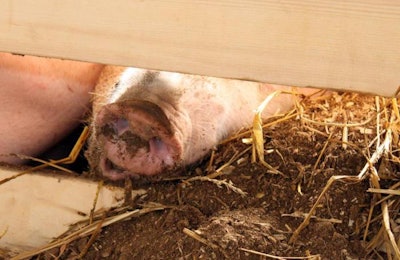
Pig manure can be turned into an adhesive for use in asphalt as a replacement for petroleum-based products. Swine producers can benefit when they dispose of their manure with the engineers who developed the adhesive technology.
Those engineers started a company, Bio-Adhesive Alliance, to produce and commercialize the pig manure adhesive.
From ivory tower to manure lagoon
Bio-Adhesive Alliance is approximately six month from having the first batch of mass-produced adhesive ready for use, said Elham Fini, associate professor of civil, architectural and environmental engineering at North Carolina Agricultural and Technical State University.
Ultimately, the process ends up a win-win for farmers, said Fini. Farmers can get rid of manure regardless of the season and reduce the size of their waste lagoons, which can help with environmental regulations, land costs and infrastructure needs.
Bio-Adhesive Alliance currently has arrangements to get manure from farms in Pennsylvania, Illinois and North Carolina, said Fini. Most farmers ship their manure to the company’s processing plant, but farms with 2,000 head of swine or more may meet alliance requirements to set up an adhesive plant on their own land with guidance from the alliance.
“More farmers have already started communicating about doing business, but the alliance must evaluate the farm first,” said Fini.
Along with producing less pollution than petroleum-based asphalt binders, pig manure adhesive also costs less to produce, according to research published in the Journal of Materials in Civil Engineering.
More compensation for high-grade manure
Generally, swine farmers don’t have to change their practices much to collaborate with Bio-Adhesive Alliance. When the alliance starts working with a farmer, the company provides guideline for maximizing the quality of manure, which is graded A, B or C depending on its water content and chemical properties. The quality of manure governs the yield of adhesive, which then determines the amount of compensation farmers receive.
Bio-Adhesive Alliance is the only company that can sell the adhesive itself due to the patents the owners hold. The company serves as a liaison with the asphalt industry. Several methods of compensation exist for farmers who dispose of their manure with the alliance.
Fertilizer has proven to be the most popular form of reimbursement, said Fini. One by-product of the adhesive production process is biochar, a type of fertilizer, and farmers can get this fertilizer back from Bio-Adhesive Alliance as part of their deal for manure. Farmers pay for the removal of the manure from their farms, then get the bio-char in return.
Overcoming shipping costs
Speaking of the demand for oil, shipping manure requires gasoline, and the more watery the manure, the more money gets burned on gasoline. The Bio-Adhesive Alliance has developed a set of guidelines and techniques to help farmers reduce the amount of liquid in their pigs’ manure and thereby lower shipping costs.
The ideal concentration of manure for adhesive production is 20 percent solids. Although five percent is the average percentage of solids in manure lagoons, Fini said farmers can condense that waste by using an in-line unit to extract solids. The Alliance can provide this device and guide farmers to make their manure as profitable as possible.
Shipping even condensed manure could kill any profitability for farmers located far from Bio-Adhesive Alliance’s facility in North Carolina, though. Farmers in distant areas can license the use of the adhesive production technology. Multiple small farms could pool their resources to get an adhesive facility for shared use.
Eventually, trucks carrying that adhesive back to the North Carolina facility could be rolling over asphalt made from pig manure.


















